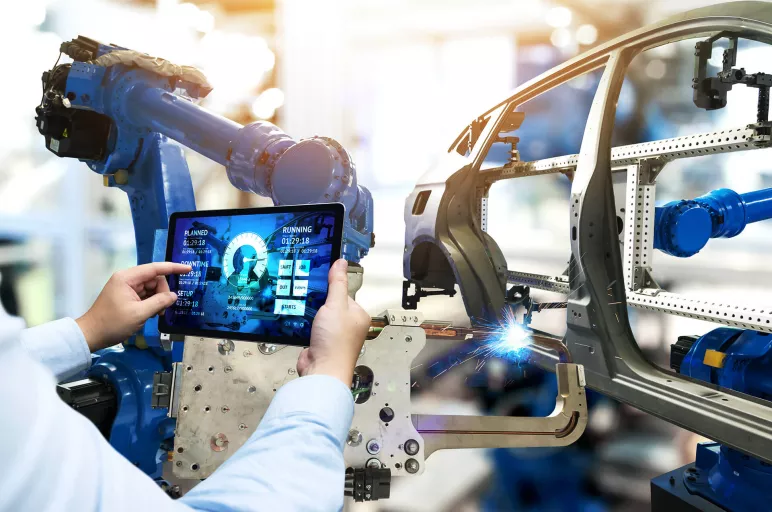
How Automakers Are Leveraging Digital Technologies to Drive Supply Chain and Production Efficiencies
June 27, 2018 | Digital Supply Chain Transformation
With the advent of Industry 4.0 and the concept of smart factories gaining prominence, the automotive sector has also started evaluating and adopting various digital technologies to improve supply chain and production efficiencies. Automotive manufacturers can leverage an array of digital technologies such as IoT, big data & analytics, automation and robotics, artificial intelligence, blockchain, 3D printing, cloud computing, cybersecurity and augmented reality. According to a KPMG survey of global automotive executives, the key objectives of the automotive manufacturing sector are faster go-to-market, reduction in downtime, process transparency, greater flexibility and customization. These objectives and the outcomes of digital technologies are aligned to aid the automotive sector achieve their set objectives. This piece provides some use cases of digital technologies in auto manufacturing and supply chain.
IoT
Among the many digital technologies, IoT will play a major role in creating system- and company-wide efficiency gains, with remote monitoring leading to better predictive and preventative maintenance, and enabling automation. Mercedes Benz has connected all its factories globally to gain visibility at the sensor level. This across-plan connectivity helps Mercedes significantly in leveraging learnings from one plant to another, keeping all data and monitoring in sync. For instance, a lead plant for compact cars can access data from other compact car plants and assist with any troubleshooting or even reprogram robots. The setup also enables concurrent rather than consecutive plant upgrades.
On similar lines, General Motors has connected about a quarter of its 30,000 factory robots in the U.S. region to the internet. Robotics manufacturer FANUC teamed up with Rockwell Automation and Cisco to deliver a solution, “Zero Downtime” (ZDT), at General Motors. Harley-Davidson implemented an asset connectivity program at its major production plant in York. Every asset on the plant floor is connected, and every step-in production is tracked and incorporated in a real-time performance management system.
3D Printing
Ford is currently testing 3D printing of large-scale car parts using the Stratasys Infinite Build 3D printer. The company is exploring potential applications for future production of vehicles, including Ford Performance products as well as personalized car parts. Increasingly affordable and efficient, 3D printing of large automotive parts, such as spoilers, could benefit Ford’s business and its customers; printed parts can be lighter in weight than traditionally manufactured parts, and may help improve fuel efficiency.
Blockchain
Tesla and Porsche are the early adopters of blockchain in the automotive sector. Tesla is at an initial stage of implementing its plan to trace cobalt (used in electric vehicles) to it sources from the Democratic Republic of the Congo to ensure ethical sourcing of cobalt. The company plans to implement a similar tracking system for nickel, as it currently faces challenges in tracing nickel back to its provenance as it comes from a three-to-four-tiered chain of suppliers. This will help Tesla gain better visibility into supply chain inventory optimization and take necessary precautionary measures in case of shortage conditions such as the recent cobalt shortage.
Porsche is the first auto manufacturer to test blockchain technology directly in cars. It has engaged with Berlin-based startup XIAN to test applications such as locking and unlocking the vehicle via an app, temporary access authorizations and encrypted data logging. The process time for opening and closing has already reduced by six times to just 1.6 seconds. Other benefits include chronological and safe recording of all activities using cryptography, easy adaptability of smart contracts without the need for additional hardware, and protection of all communications between participants.
While some digital technologies such as cloud computing and plant automation are relatively mature in the automotive sector, automotive manufacturing companies are now at the initial stages of evaluating and adopting other mainstream digital technologies such as IoT, big data & analytics, 3D printing, blockchain, artificial intelligence, etc. Some of the early adopters of such technology in the auto manufacturing segment have started realizing benefits such as higher production and operational efficiency, higher production turnaround, reduction in production downtime, ease of customization and better supply chain risk management. The next five to six years will see increased adoption of these digital technologies by the automotive manufacturing segment.
Sources:
- http://bitcoinist.com/porsche-leads-pack-race-automotive-blockchain-integration/
- https://www.reuters.com/article/us-mining-blockchain-cobalt/blockchain-to-track-congos-cobalt-from-mine-to-mobile-idUSKBN1FM0Y2
- https://media.ford.com/content/fordmedia/fna/us/en/news/2017/03/06/ford-tests-large-scale-3d-printing.html
- https://media.daimler.com/marsMediaSite/en/instance/ko/Industrie-40--Digitalisation-at-Mercedes-Benz-The-Next-Step-in-the-Industrial-Revolution.xhtml?oid=9272047
- http://www.industrial-ip.org/en/industrial-ip/internet-of-things/general-motors-harnesses-the-iiot



